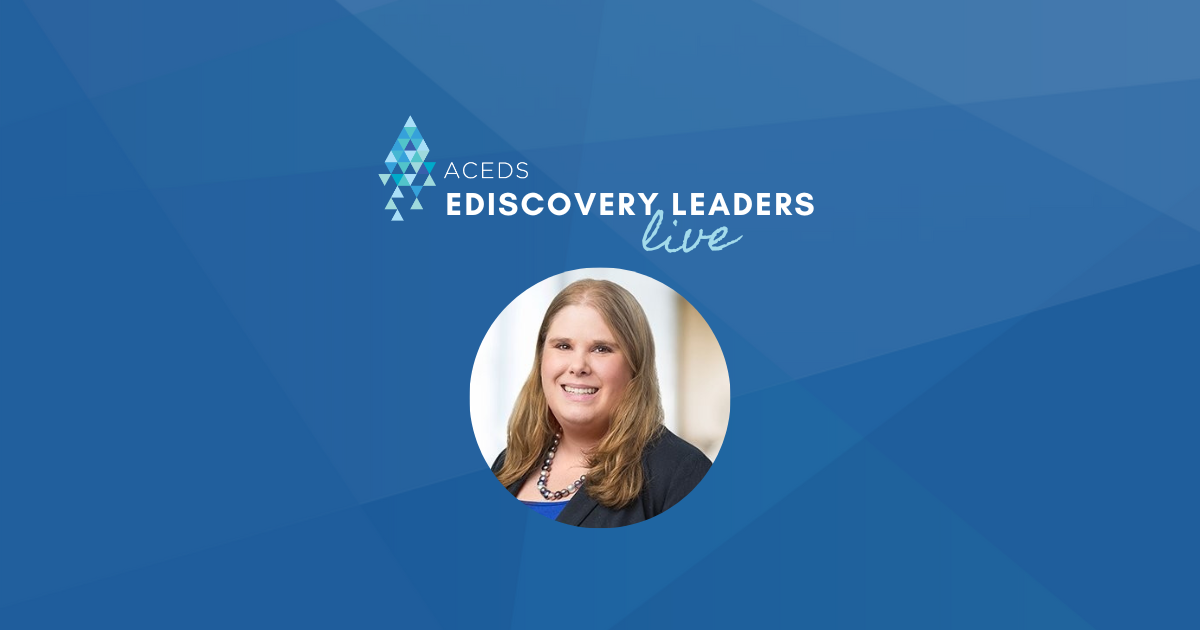eDiscovery Leaders Live: Erin Toomey of Epiq
Erin Toomey, Senior Director, Antitrust and Competition Practice Group at Epiq, joins George Socha, Senior Vice President of Brand Awareness at Reveal, for ACEDS #eDiscoveryLeadersLive.
Erin is a Senior Director at Epiq leading the Antitrust and Competition Practice Group and is based in the Washington, DC office. With over 15 years of experience, her primary focus is review and production management in litigation, government, and internal investigation cases. In addition to these services, Erin has extensive experience in the complete EDRM life cycle and has provided support and strategy development for collections, processing, content and privilege review and productions. Erin has managed projects including international cases with complex data privacy concerns spanning multiple jurisdictions as well as civil litigations of varying sizes. She is a graduate of Wake Forest University where she focused on Management Information Systems and Project Management studies.
Erin started our discussion by sharing the path she took to eDiscovery and ultimately to Epiq. She talked about her practice group and its growth. Erin then spent the bulk of our time together focusing on the various ways her team is taking advantage of AI and analytics including TAR in their antitrust and competition practice – for second requests, to facilitate privilege review – and on strategies for working effectively with regulators.
Key Highlights
- [2:30] What brought Erin to where she is now – straight from school to eDiscovery.
- [4:01] Handed a Concordance database and told, good luck.
- [4:36] The opportunity to join Epiq and lead and grow the Antitrust and Competition Practice Group – now a global investigations group.
- [5:10] The state of the practice group when she joined Epiq.
- [5:52] What the practice looks like today.
- [6:35] If the Erin of today could sit down with the Erin from 17 years ago.
- [7:24] What is means to become a global practice group.
- [8:28] The practice group’s expanded geographical scope.
- [9:07] Leveraging analytics.
- [10:24] The technological capabilities they use and how they use them.
- [10:47] Using AI for privilege review.
- [11:18] Helping with advocacy support on second requests.
- [11:57] How they build their own AI models.
- [13:22] The relationship between TAR processes and AI models.
- [14:16] Reusing AI models.
- [15:47] What AI models can be used for.
- [16:29] Getting to key issues with only a handful of documents to start.
- [17:33] The DOJ’s race to leniency.
- [18:44] Using AI and analytics to bolster search terms when identifying privileged content.
- [20:49] Using AI and analytics to evaluate privilege calls.
- [23:18] How using AI and analytics helps clients get to the privilege finish line faster.
- [25:31] The make-up of her team.
- [27:16] Navigating discussions with regulators.
- [29:10] The nuances of dealing with different regulators.
Key Quotes
-
- “[In my practice group] we have experts across the entire spectrum. We have experts who focus day in and day out on these global investigations, on these antitrust matters, including forensics resources, project managers, and client services. And then we have TAR specialists and document review experts as well who work project to project across these antitrust matters.”
- “There are still even the largest of second requests that require search terms and a linear review, but our first foot forward is always to leverage analytics.”
- “We work a lot with NexLP and these analytics tools to create trained models based on subject matter expertise or with our document reviewers, depending on what we are doing, and identify the responsiveness.”
- “We try to take it that step further and see how without a lot of extra lift we can bring other things to bear in responding including using AI for privilege. We’ve had a lot of success in identifying privileged content outside of the traditional search terms that would normally be used…. By using concept analysis or creating an additional AI model we’re able to identify those documents.”
- “A big bet that we’re making on what’s next in the industry as far as the acceptance of AI, is beginning to build these repeat models that can be leveraged for clients to make sure that you’re taking what you learned in a deal or a litigation and applying that in future cases as well.”
- “We’ve done over 50 second requests and other merger control investigations just in the last 18 months.”
